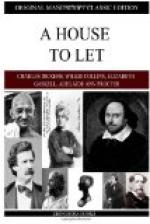against her; although this last had been the final
goad to the course she took. She walked away
almost at headlong speed; sobbing as she went, as
she had not dared to do during the past night for
fear of exciting wonder in those who might hear her.
Then she stopped. An idea came into her mind
that she would leave London altogether, and betake
herself to her native town of Liverpool. She
felt in her pocket for her purse, as she drew near
the Euston Square station with this intention.
She had left it at home. Her poor head aching,
her eyes swollen with crying, she had to stand still,
and think, as well as she could, where next she should
bend her steps. Suddenly the thought flashed
into her mind that she would go and find out poor Mr.
Frank. She had been hardly kind to him the night
before, though her heart had bled for him ever since.
She remembered his telling her as she inquired for
his address, almost as she had pushed him out of the
door, of some hotel in a street not far distant from
Euston Square. Thither she went: with what
intention she hardly knew, but to assuage her conscience
by telling him how much she pitied him. In her
present state she felt herself unfit to counsel, or
restrain, or assist, or do ought else but sympathise
and weep. The people of the inn said such a
person had been there; had arrived only the day before;
had gone out soon after his arrival, leaving his luggage
in their care; but had never come back. Norah
asked for leave to sit down, and await the gentleman’s
return. The landlady—pretty secure
in the deposit of luggage against any probable injury—showed
her into a room, and quietly locked the door on the
outside. Norah was utterly worn out, and fell
asleep—a shivering, starting, uneasy slumber,
which lasted for hours.
The detective, meanwhile, had come up with her some
time before she entered the hotel, into which he followed
her. Asking the landlady to detain her for an
hour or so, without giving any reason beyond showing
his authority (which made the landlady applaud herself
a good deal for having locked her in), he went back
to the police-station to report his proceedings.
He could have taken her directly; but his object was,
if possible, to trace out the man who was supposed
to have committed the robbery. Then he heard
of the discovery of the brooch; and consequently did
not care to return.
Norah slept till even the summer evening began to
close in. Then up. Some one was at the
door. It would be Mr. Frank; and she dizzily
pushed back her ruffled grey hair, which had fallen
over her eyes, and stood looking to see him.
Instead, there came in Mr. Openshaw and a policeman.
“This is Norah Kennedy,” said Mr. Openshaw.
“O, sir,” said Norah, “I did not
touch the brooch; indeed I did not. O, sir,
I cannot live to be thought so badly of;” and
very sick and faint, she suddenly sank down on the
ground. To her surprise, Mr. Openshaw raised
her up very tenderly. Even the policeman helped
to lay her on the sofa; and, at Mr. Openshaw’s
desire, he went for some wine and sandwiches; for
the poor gaunt woman lay there almost as if dead with
weariness and exhaustion.




